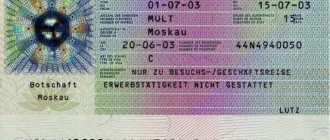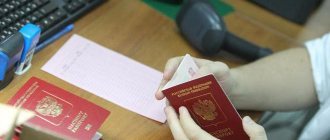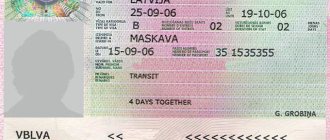You can go to live in Germany and obtain permanent residence in this country in several legal ways in 2021. By understanding the intricacies of German legislation, you can achieve your goal.
Germany, despite the memory of the Second World War, is one of the Eurozone countries that attracts many glances from residents of Russia and Ukraine. The reasons for this attention are the legislative conditions for emigrants. Many people want to immigrate to Germany, from students to financially wealthy potential investors.
Typical small town in Germany
Compared to Canada or Australia, the Federal Republic seems very closed, but this is only at first glance.
The country's legislation provides several opportunities for emigrants.
Obtaining a national visa category D
A visa permit is issued at the diplomatic mission of the Federal Republic of Germany (in Moscow it is located at Leningradsky Prospekt, building No. 95 “A”).
For registration you will need the following documents:
- International passport.
- Internal passport.
- Expired foreign passports.
- Completed application form (2 copies).
- 3 photographs.
- Documents of the receiving party (in the case of employment - an employment contract, in the case of admission to a university - a certificate of enrollment).
- Documents confirming your financial situation.
- Health insurance policy
Basic requirements for photographs:
Visa photo requirement
- They must be made no earlier than 6 months before the date of filing the application.
- Size: 35 by 45 mm.
- A face without emotions.
- Closed mouth.
- Profile photo.
- No glasses (with the exception of transparent ones, in which the frame does not cover part of the face and the glass does not glare).
- Light background.
- Maximum clarity.
Basic requirements for the policy:
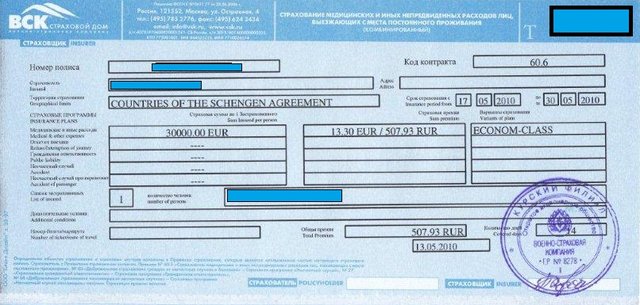
Medical insurance for a visa to Germany
- Coverage of at least 30,000 euros.
- Issue must be carried out only in accredited companies.
- Coverage area - all countries of the European Union and countries that are not members of the EU, but are members of the Schengen Agreement.
- Franchise no more than 150 euros.
- Cases of compensation – hospitalization, repatriation to one’s home country in case of illness or death.
The cost is 75 euros . Persons under 18 years of age pay a consular fee of 37.50 euros. The processing time ranges from 6 to 8 weeks.
It is important to remember that all documents must be originals. In addition, you will need to make 2 sets of copies of all papers. If the documents are not in German, you will additionally need to provide a sworn translation certified by a notary.
Resident card
The first stage of moving to Germany for permanent residence is obtaining a national visa category D. Only this visa provides the opportunity to obtain a German residence permit. If a Russian citizen comes to Germany on a tourist visa, then he has no grounds for obtaining a residence permit in this state.
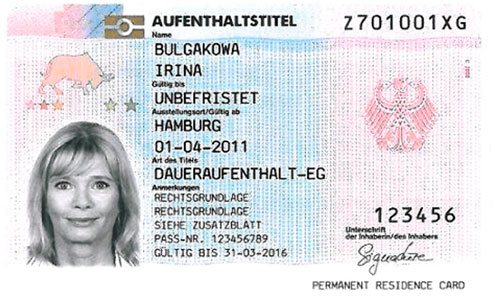
This is what a residence permit looks like in Germany
Advantages of a residence permit
A foreign resident who holds a residence permit in this state has the right to freely move around the Schengen countries without pre-issued visas. Also, a residence permit is one of the grounds for obtaining loans or loans from German banks .
The process of obtaining a residence permit
To obtain a residence permit, a person must have grounds confirming the fact that he needs to stay in Germany for a very long time (more than 90 days with a Schengen visa). As a rule, national visa category D is issued to people who go to work in Germany under a contract, study, get married or carry out family reunification procedures.
Often the process of obtaining a residence permit begins in the country of actual residence; a foreign resident will need not only to obtain a national visa, but also to collect a lot of documents.
A national visa is issued for a period of 1 year with the right of further extension. After one year, the foreigner has the right to apply for a residence permit. To do this, he needs to contact the local registration office, called in Germany “Einwohnermeldeamt” and provide the employees of this service with all information regarding his identity, place of residence and purpose of stay.
There are several ways to move to Germany
After entering all the data and submitting the documents, the person needs to wait a certain time and, if a positive decision is made, obtain a residence permit from the local immigration service “Aufenthaltserlaubnis”.
Initially, the document is issued for a period of 1 year, but it can be renewed annually.
After 5 years of permanent residence in Germany, a person has the opportunity to apply for permanent residence, and after another 3 years he can obtain citizenship of this republic.
The package of basic papers required for obtaining a residence permit consists of:
- Photocopies of passport (foreign and domestic).
- Photocopies of entry visa.
- Two biometric images.
- Health insurance policy.
- Medical certificate. This document must confirm that the person is not a carrier of dangerous infectious diseases, such as syphilis, hepatitis, HIV infection, tuberculosis, Lyme disease and others. The certificate is obtained strictly from a German medical institution.
- A certificate that confirms that a person has no criminal record in his home country.
- A certificate confirming that the foreign resident has not been brought to criminal or administrative liability in Germany.
- Certificates of registration of place of residence.
- A real estate lease agreement or documents confirming that the real estate where the applicant lives in Germany is his property.
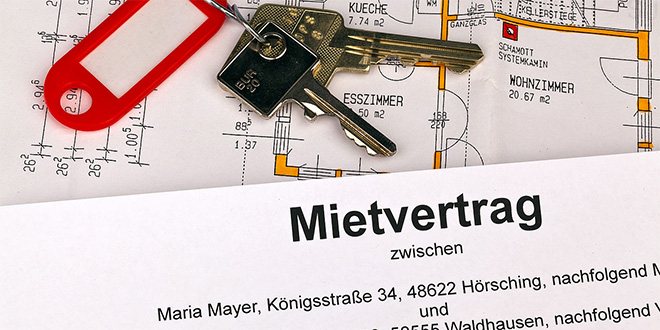
Real estate lease agreement in Germany
- Certificates confirming financial solvency. If a person works, then he just needs to bring a certificate from his place of work indicating the annual salary. If a person is not employed, then in this case he must have funds in the amount of at least 8,000 euros for a year of residence in Germany.
- Documents confirming the grounds for long-term stay in Germany.
If a foreign resident moves with children, then additionally submit their birth certificates or passports. If you are moving with your spouse, you must submit a certificate confirming the fact of marriage and identification documents.
A residence permit can only be obtained if you have grounds confirming the need for a long stay on the territory of this republic.
Availability of real estate as a basis for obtaining a residence permit
It should be noted that the presence of real estate in almost any country of the European Union is not a direct basis for applying for a residence permit and further legalization in the country. Germany is also no exception.
Owned German real estate gives its owner the right to apply only for a multiple-entry visa with the right to stay in Germany or countries included in the Schengen Union for no more than 180 days a year, namely 90 days during each half-year.
This time is quite enough to go on vacation, undergo treatment, rent out an apartment, or pay taxes if the property was purchased as a second home or for investment purposes. If you have set a goal for yourself and asked yourself the question: how to move to Germany for permanent residence from Russia, then in this case it is necessary to look for other ways of legalization in the country, and the first step is obtaining a residence permit.
Grounds for obtaining permanent residence and residence permit in Germany
There are several legal ways to obtain a residence permit in Germany in 2021.
Employment
Contract work implies the possibility of obtaining a residence permit. But it is worth noting that it is very difficult for residents from countries that are not members of the EU to find a good and well-paid job.
To get a job, you will not only have to enter into an employment contract with a German employer, but also obtain a work permit, which is issued by the Federal Employment Agency in the Federal Republic of Germany.

People who have a blue card have a better chance of finding work and obtaining a residence permit. Often it is issued to highly qualified foreign specialists who have a profession in demand in Germany.
an invitation to work from a German company with a salary of at least 53,600 euros per year can receive a blue card (some professions have other salary standards, for example, to receive a blue card, a specialist in the field of IT technology only needs to have salary of at least 41,800 euros per year).
A significant advantage of the blue card is its validity (4 years) and the ability to transport spouses and children to Germany.
Doing Business
Opening your own business and running it in this country is the most affordable immigration option for Russians in Germany. But it is worth remembering that the capital to start a business must be at least 250,000 euros. The owner will also need to create at least 5 jobs. Opening your own business in Germany is not very easy.
How to open your own business in Germany, watch the video:
A foreign resident will have to prove to the local authorities the prospects and possible benefits for German citizens from opening their own business, as well as provide a detailed business plan with calculations of profit and the payback period of the project.
Education
All foreign students who have entered and are studying at higher educational institutions in Germany must receive a residence permit for the entire period of study. To receive it, you will need to provide certificates of enrollment in a higher educational institution or college, as well as a bank account statement, which will confirm that the applicant has paid for training and has the financial capacity to maintain and live in Germany (an amount of at least 8,000 euros per year for accommodation ).
After graduating from an educational institution, a foreign resident has the right to extend the residence permit for another year and a half in order to search for work or employment.
Family reunion
According to the law, the spouse and children of a foreign resident who has a residence permit in this republic also have the right to receive a document for a long stay. To obtain a residence permit, the spouse and children over 16 years of age must speak German.

Marriage
Marrying a German citizen is not enough to obtain a residence permit. A woman must first get married, then apply for a fiancé visa, come to Germany, and obtain a residence permit on the basis of family reunification.
Entering into fictitious marriages is punishable by a ban on entry into the country for 5 years.
Immigration for Jews
In 1991, the government of the Federal Republic of Germany introduced a program for people with Jewish roots. It can only be used by those persons who are related to Jewish nationality and live in the countries of the former Soviet Union and Eastern European countries.
Grounds for obtaining German citizenship by persons of Jewish nationality:
- Having citizenship of one of the USSR countries.
- Absence of moving for permanent residence to another country with the exception of the countries of the USSR and the countries of Eastern Europe.
- Confirmation of belonging to the Jewish race.

The following cannot use the program:
- Figures of the Communist Party of the Union of Soviet Socialist Republics.
- Persons with a criminal record.
- Employees of the State Security Committee who participated in subversive activities against Germany.
An applicant for a German passport under this program must meet the following basic requirements:
- Practice Judaism.
- Have a high material income.
- Availability of a positive integration forecast.
- Availability of confirmation from any Jewish community in Germany, which will confirm that the community is ready to accept the applicant.
Immigration of ethnic Germans
Ethnic Germans are foreign citizens who have relatives with German citizenship. This concept refers to a category of people whose ancestors were residents of Germany in the past and for some reason left the country. In other words, the process of immigration of ethnic Germans is repatriation, that is, a return to their homeland.

Only those people who can prove that their grandparents were Germans can move to Germany under such a program . As proof, you will have to provide all documents of living and deceased relatives. To move to Germany under this program, the applicant will need to undergo an interview with the German consul in German.
According to changes in the law on the repatriation of Germans to their homeland dated September 13, 2013, foreign residents who had ancestors in Germany, but cannot prove this officially, for relocation can take a German language test and receive a certificate from the Goethe Institute, which confirms that the foreigner speaks the national language of Germany at level B1.
Au Pair Program
The Au Pair program involves the move of a foreign resident to Germany to live with a family on the basis of providing help with housework or childcare. The foreigner is accommodated in a separate room (this is a mandatory condition), and is given about 300 euros monthly for pocket expenses.
In return, the foreigner helps the family for 6 hours a day or 30 a week. All expenses regarding accommodation and food are borne by the host family.

Au Pair program is a great chance to gain a foothold in Germany
In his free time, a foreigner can visit places of interest to him, meet the residents of Germany, and attend language courses. A foreigner leaves for 1 year. This time is usually enough to thoroughly learn the language, enter a university, find a permanent job or enter into an official marriage.
Travel to Germany under this program is processed according to the general scheme. A prerequisite for departure under the program is knowledge of the German language at level A1.
Volunteers
You can leave under the program for 1 year. All expenses related to food, accommodation and pocket expenses are borne by the state. You can work as a volunteer in:
- Federal Volunteer Service.
- European Voluntary Service.
- Voluntary Service for Development Policy.
- International joint volunteer services.
Ways to immigrate to Germany
If you have already visited European countries, you should know how strict the laws are for immigrants, how difficult it is to obtain a residence permit, and what obstacles people who changed citizenship had to overcome.
Germany’s migration policy provides for many nuances that must be taken into account in order to successfully go through the thorny path from the moment of collecting documents to obtaining permanent residence status, and then citizenship.
Currently, there are thousands of law firms and organizations that, for a small fee, will help you fill out registration forms, learn a language, open a business, reunite your family, pass an interview at the consulate or fill a vacant position on the labor market in Germany. Their activities allow CIS citizens to obtain residence permits and realize their potential abroad.
Let's take a closer look at the methods of immigration to Germany and highlight the main aspects that you should focus on. Rest assured: knowing your rights and laws will allow you to legally travel to Berlin, Hamburg, Frankfurt, Bremen and other cities in Germany, where you can fully realize yourself.
Immigration for Jews
If your parents or grandparents are of Jewish descent, you can apply for German citizenship. To do this, you only need to present a document from a relative (birth certificate issued before 1991), which indicates the nationality of “Jew”.
Of course, first you will be allowed permanent residence with the right to work, and after 6 years you will be able to become a full German citizen. Participants in this program must have an A1 certificate confirming knowledge of German or English.
You can read more about this in the article “Jewish Immigration.”
Immigration for Family Reunification
A residence permit and the right to work can be obtained by a family member of a foreigner who permanently resides in Germany or has acquired German citizenship. In this way, the authorities help reunite a family whose representatives are separated by a state border at the time of filing the relevant request. By law, you can invite your children, parents or spouse. Depending on the degree of relationship, a special package of documents may be required.
Immigration through employment in Germany
If your profession is in short supply on the German labor market, you work as a freelancer, have a higher medical education or are engaged in research, you can obtain a work permit in this country. Departure is possible on the basis of a work visa, which requires knowledge of the language, as well as documents confirming education (diploma) and a guarantee of employment (employment contract). The list of professions available to immigrants is quite extensive.
You can find out more detailed information about employment in the article “Working in Germany”.
Business as a way to obtain citizenship
Opening your own business is the most expensive way to immigrate. To do this, you need to actually conduct commercial activities, maintain the functionality of the office, hire staff, pay taxes and declare profits annually.
If it is determined that your company is unprofitable, it will not be possible to renew your residence permit. Therefore, think several times before engaging in investment activities abroad.
If you nevertheless decide to invest money in the development of your business, it will be useful for you to read the article “Business in Germany”.
Studying as a real chance for immigration

The high quality of education and affordable housing prices in all German cities attract many future students. Graduates of schools, lyceums, technical schools and even universities are well aware that a diploma issued by a German university will help them quickly find a job and receive a decent salary.
First, potential students are issued a student visa for up to 5 years. Upon completion of your studies, you can obtain a residence permit to search for work for up to 18 months, and then a residence permit to work or develop your own business.
You can learn how to become a student at a German university in the article “Studying in Germany.”
Marriage as a method of immigration
Surely you have seen advertisements on the Internet for marriage agencies that help girls meet and marry foreigners. Most of the candidates for the role of potential husbands are from Germany. Therefore, it is not surprising that our compatriots take advantage of this opportunity, well aware that in this way they can obtain German citizenship and all the advantages of living in a European country. There are no age restrictions, but you must know the language at level A1. First, a residence permit is issued for 1-3 years, then permanent residence or citizenship.
It should be borne in mind that international marriages in Germany are carefully checked for fictitiousness, and violators of the law face severe punishment: a fine and even imprisonment for up to 3 years.
After execution of the punishment, forced deportation and a ban on entry into the territory of the Schengen countries follow. The duration of the ban is determined individually in each specific case.
If you are interested in this type of immigration, read the article “Marrying a German.”
Immigration through refugee
The Germans are quite loyal to people who have been persecuted or oppressed. However, in order to obtain refugee status, you must provide convincing evidence of infringement of your (or someone in your family) rights and freedoms or oppression in your homeland. You can apply for asylum in Germany only on the condition that you are already in the country, arrived legally and definitely crossed the border of your homeland, and did not arrive through a third country.
Find out more about how to properly prepare documents and what forced migrants can count on from the article “Refugees in Germany.”
Immigration under the Late Migrant Program
Repatriation of Germans to Germany involves passing tests for knowledge of the German language, traditions, customs, holidays, as well as documentary evidence of blood relationship. It is enough that one of the family members (parents, grandparents) has the nationality “German”. You can submit an application for immigration while staying in Germany or the country in which you were born and currently live. Immediately after moving, you will receive the right to employment, social guarantees, as well as other privileges, which you will learn more about in the article “Late Migrants”.
What other methods of immigration are there?
Some politicians argue that the migration crisis in Germany is gaining momentum again. However, for citizens who are skeptical about statistics and want to obtain German citizenship or at least the right to permanent residence at any cost, there are no impossible tasks.
The PuMa program is now very popular, allowing you to immigrate and get a job even with a secondary vocational education, for which students have studied for more than 2 years.
You will have to work in factories and various industrial enterprises. To receive an invitation from a German company, you need to score at least 100 points, which are assigned as follows: 50 points for knowledge of the German language at level B1, 50 points for having relatives in the country of immigration, 25 points for knowledge of French or English at level B1, 25 points – if you have experience living in the EU.
This program is fundamentally different from the Blue card EU - Blue Card, according to which only teachers, doctors, scientists, engineers, architects, and IT industry specialists with an average salary of 49,600 euros per year have the right to work.

Please note that PuMa is a pilot project that will operate until September 30, 2021 exclusively in the states of Baden-Württemberg and Stuttgart. Next, the German government will evaluate the effectiveness of the program, as well as migration issues, and consider the feasibility of implementing PuMa throughout the country.
There is also a program under which you can obtain the right to temporarily stay in Germany to study a language and take courses in a specialty. As a rule, such programs are designed for a short period of time (up to 90 days) and are available to holders of Schengen visas.
If you need to stay in the country for more than 90 days, you will have to provide the consulate with proof of compelling reasons for this. In 1.5-3 months, your application will be reviewed and, if you are lucky, you will be given a residence permit for up to 12 months without the possibility of subsequent extension. Such programs are usually used by citizens of Russia, Ukraine, and Belarus who really want to learn the language and are ready to immigrate to Germany.
Features of permanent residence in Germany
Travel to Germany is possible only after obtaining special permits. The following categories of foreign citizens have advantages in obtaining both temporary types of residence permits and permanent ones:
- those who can prove their German roots;
- belong to Jewish nationality.
In the first case, those wishing to move will not only be required to document their origin, but will also need to pass an interview test on their knowledge of the national characteristics of the German people.
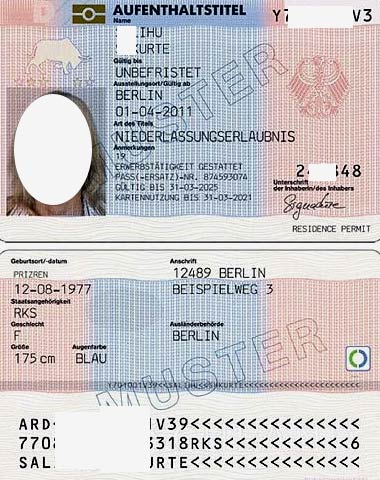
Sample permanent residence card in Germany
In the second case, those wishing to emigrate to German territory will only be required to provide proof of the residence of their relatives on the territory of the republic during the Second World War.
Before applying for permanent residence in Germany, you must obtain a residence permit. Residence permits in Germany can be urgent or unlimited.
A temporary residence permit provides for the residence of foreigners for a certain period of time in the country: from 2 weeks to several years. This can include citizens who, due to certain circumstances, cannot leave Germany due to visa requirements, students, as well as citizens who came to the republic on business issues.
Indefinitely grants the right to reside in Germany for life. In order to obtain this right, you must have been married for at least three years in one of the German states. Or live in the country during the educational process in one of the educational institutions of the country.
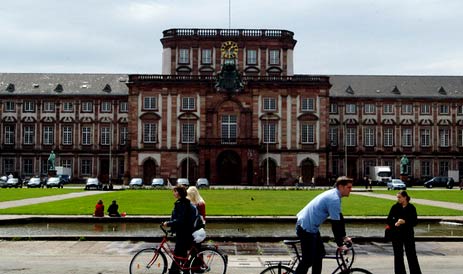
University in Germany
From the point of view of legislative acts, they have a very positive attitude towards children who have lived in the territories of the republic for more than five years during their sixteen years. Highly qualified, highly specialized specialists invited from other countries can immediately receive a permanent residence permit. For these categories, leaving the country is less accessible.
Also, the following categories can receive permanent residence in Germany:
- Citizens married to a representative of the German people, who have lived together for at least three years and have an independent source of income;
- Citizens who wish to receive education in Germany (and also have a strong desire to master the German language of local dialects);
- Potential investors.
The first two categories have certain restrictions that do not allow them to travel freely to other countries.
Permanent residence permit is issued upon expiration of the residence permit after 5 years of permanent residence in Germany.
The permanent residence document gives its owner the same rights as a resident of Germany. The only thing that foreigners with permanent residence do not have the right to is participation in elections and employment in government agencies.
Permanent residence is issued only after 5 years of residence in Germany on the basis of a residence permit.
There are 2 types of permanent residence in Germany:
- "Niederlassungserlaubnis" provides for the issuance of permanent residence on the basis of current German legislation.
- “Erlaubnis zum Daueraufenthalt” provides for the issuance of permanent residence in the countries of the European Union.
If a permanent residence permit “Niederlassungserlaubnis” is issued by a working foreign resident, then he is required to pay a sum of money equal to 60 monthly contributions to the German tax system.
Permanent residence is issued at the German embassy, consulate or the Office for Foreigners on the basis of residence for a period of at least 5 years and the provision of a package of documents consisting of:
- Statements.
- Foreign passport.
- 2 photographs.
- Income certificates for the last 90 days.
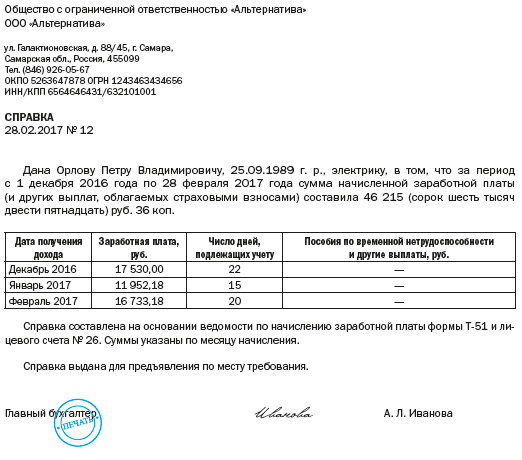
Example of income certificate
- Certificate confirming the person’s employment.
- Certificate confirming the presence of a place of registration.
- A document confirming the availability of housing.
- Health insurance policy.
- A certificate that confirms that a foreign resident has completed an integration course.
Permanent residence in Germany

Contact us
German hard work and perseverance made it possible to create a strong state that continues to play a significant role in the European arena. The second step on the path to naturalization here is obtaining a permanent residence permit, which will subsequently allow you to become an EU citizen.
Benefits of immigrating to Germany:
- The right to free entry into the country, as well as other Schengen states
- Permanent residence status guarantees state support for the first time after moving
- The opportunity to find a well-paid job in one of the most successful countries in the world, or create your own business in the EU
- Permanent residence will provide you with the right to soon obtain EU citizenship
The conditions and requirements that will allow you to obtain permanent residence in Germany are listed in §9 of the Residence Law.
Also, those who plan to settle in Germany should take into account that there are two possible options for permanent residence in this country. Niederlassungserlaubnis (abbreviated NE) is a residence permit and is issued on the basis of German law. The second, DA-EG or Erlaubnis zum Daueraufenthalt-EG, is a permit for permanent residence in the European Union and was introduced in connection with the standardization of German laws with EU norms.
Grounds for obtaining permanent residence in Germany:
- 5 years of legal residence in Germany on the basis of a residence permit, subject to compliance with the necessary requirements
- Higher education and subsequent employment in the specialty in Germany
- If the residence permit was opened for independent economic activity, then permanent residence permit can be obtained on the same basis
- 2 years of marriage to a German citizen
There are also several options that, according to the law, will allow you to obtain permanent residence immediately:
- Ethnic Germans can obtain permanent residence for “late migrants”. To do this, it is necessary to confirm that one of the applicant’s parents has German citizenship.
- The opportunity to immigrate to Germany is also provided for Jews living in the vast expanses of the former USSR. However, since 2005 this path has become somewhat more complicated.
Regardless of the grounds on which permanent residence in Germany was obtained, it will provide its owner with the same benefits enjoyed by other residents of the state. The only exception will be the opportunity to hold public office and take part in elections.
Please note that if an NE is issued, the applicant who is employed will have to pay 60 monthly contributions to the German tax system. Their size is set depending on the amount of monthly income.
Required documents:
- — Applicant’s passport
- - Birth certificate
- — Photos of the established sample
- - Medical insurance
- — Certificate of proficiency in German at a level not lower than B1
- — Documents confirming that the applicant has real estate that meets established standards
- — A document that confirms the applicant’s legal employment
German legislation has been carefully designed to ensure maximum control over the immigration process into the country. Obtaining permanent residence status is no exception. To go through all the stages and receive the coveted plastic card, you will have to collect a hefty volume of documents, as well as provide significant evidence of your trustworthiness - of course, this will require effort, time and financial resources. Therefore, for those who do not intend to risk their own future in Europe, a similar status in another, more loyal state may be a good option to replace permanent residence in Germany. Among the EU countries, young states are especially friendly towards foreigners. So you can get permanent residence or even Romanian citizenship in just 6 months with a competent approach to the issue.
If you are planning to immigrate to the EU, having received a permanent residence permit in Germany, or are still choosing the optimal direction for immigration, we will be happy to answer any of your questions. Contact us now!
To get a consultation
Now anyone can obtain Romanian citizenship!
Collection and preparation of all documents to obtain a Pole's Card!
Legal registration of Bulgarian citizenship, without knowing the language!
Additionally on the topic:
Romanian citizenship
Obtaining Romanian citizenship is a justified, reasonable step towards your bright future and the future of your children, since a Romanian passport means all the rights and benefits of a citizen of the European Union, in other words, freedom. Read more…
EU immigration
EU citizenship is an undeniable advantage not only for businessmen, but also for citizens who want to move to live and work in one of the EU countries. Make the process of obtaining second citizenship quick and with a guarantee of results. Read more…
Hungarian citizenship
A complete list of programs for obtaining permanent residence and second citizenship of the European Union. All details of the process of obtaining a second passport. Qualified legal assistance for obtaining second EU citizenship with a guarantee of results. Read more…
Polish citizenship
Changes in the Polish Law on Citizenship in 2021, foreigners have the opportunity to obtain Polish citizenship in just 1 year of residence in Poland. Become part of the European Union with all the rights and opportunities of EU citizens. Read more…
Obtaining the status of a German citizen
You can obtain citizenship in this country only after 8 years of living on its territory. If a foreign resident marries a German citizen, he has the right to obtain resident status within 3 years after arriving in Germany. Ethnic Germans and their children, as well as spouses, receive citizenship immediately after arrival . Persons who moved to Germany under the Jewish immigration program can obtain citizenship after 6 years of residence in this republic.
The main condition for obtaining citizenship is the renunciation of the citizenship of one’s home country. If a person completes special integration courses, the period for obtaining citizenship is reduced by 1 year. A reduction of another 1 year is possible if the foreign resident speaks German at level B 2.
German language test
Every immigrant over the age of 10 is required to take a test of knowledge of the German language, which consists of written tasks and listening. The cost of taking the test is 25 euros. Each foreign resident is given the opportunity to be tested an unlimited number of times.
The tests are taken in, and after passing, a special certificate is issued.
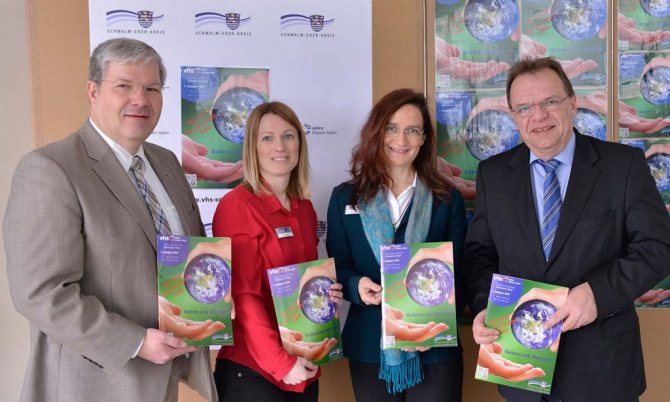
Such certificates are issued to Volkshoschule participants
Illegal immigration
According to statistics, today there are from 200 to 400 thousand illegal immigrants living in Germany. Illegal immigrants are considered foreign citizens who live in the country without a residence permit, permanent residence or citizenship, as well as people who entered into a fictitious marriage or are living in the state on an expired visa.
Staying on an expired visa is punishable by a fine of 100 to 4,000 euros. The amount of the fine depends on the length of delay. The amount of the penalty is determined by an employee of the Office for Foreign Nationals or a visa officer.
In addition to the fine, the violator is included in the German national register of violators (AZR) and the Schengen register of violators (SIS).
In addition to fines, immigrants are subject to quarantine and deportation. Quarantine means imposing a ban on entry into a country for a certain amount of time. For example, for an expired visa, crimes committed or unpaid fines, a person may be prohibited from entering the territory of Germany for 3 to 12 months.
Is it worth going to Germany in 2021, you will find out from the video
Purchasing real estate in Germany
Purchasing real estate in Germany does not give the owner the right to obtain a residence permit or permanent residence in this state. But the fact of having your own real estate can become the basis for obtaining a multiple-entry Schengen visa, which provides for multiple entries into the territory of this state and stay on it for 90 days for six months.
Conditions for refugees
Given the high standard of living, social sphere and geographical location, Germany looks very advantageous from the point of view of obtaining political asylum.
Statistics from recent years indicate that Germany ranks second in Europe in applications for permanent residence for refugees from different countries.
And this despite the fact that only every fifth application for refugee status is satisfied by regulatory authorities. In addition, leaving their country is quite problematic for many foreigners, otherwise the number of applications for refugee status would be greater.
The legislative acts of the republic do not distinguish between the conditions of oppression of human rights and freedoms, therefore political asylum in Germany can be obtained on the same grounds as on the basis of social oppression.
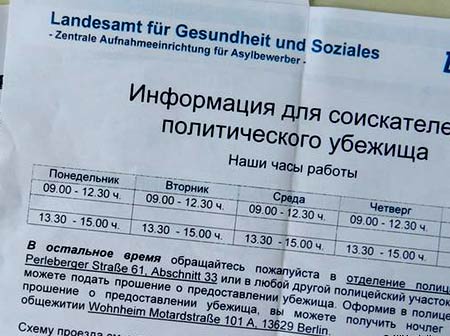
In addition, the development of new social movements and opposition to their conservative existing society often leads to the fact that individual citizens are forced to move to a place where they will not be persecuted for their words and actions. Where are the words “I dress the way I want; “Whoever I want, I live with” will not threaten the life and health of a citizen.
It should be noted that in order to become a refugee in Germany, you must provide significant evidence of a threat to life and know all the pitfalls of this status. First of all, you must be legally present in the country, and secondly, documents must be submitted exclusively in Germany, otherwise the application will be forwarded to the country in which the application was registered.
Third, the move must take place directly from the emigrant’s country, excluding possible transits, otherwise the applicant will face a 100% refusal.
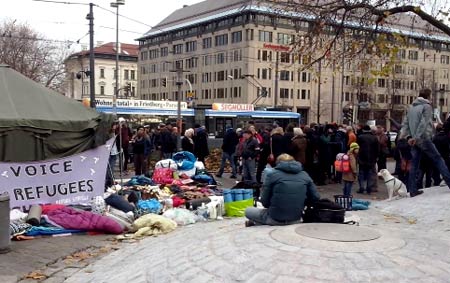
All petitions and cases of refugees are handled by a special body, which is staffed by experienced professionals - psychologists. This is necessary, first of all, to assess citizens who, due to circumstances beyond their control, have lost their documents, for whom emigrating to Germany means starting a new life.
A very important circumstance for obtaining citizenship in Germany is the presence of a legal consultant on refugee issues, as he will help to understand the numerous checks and protect the interests of the applicant. Practice shows that the majority of citizens who use the services of such specialists receive the right to stay in the country as a refugee.
The movement of citizens claiming refugee status is strictly prohibited even within the federation. Therefore, it will not be possible to leave the country for a long time. But it is worth remembering that this is a very precarious status and at any moment a decision can be made to terminate the special status and the foreign citizen can be deported.
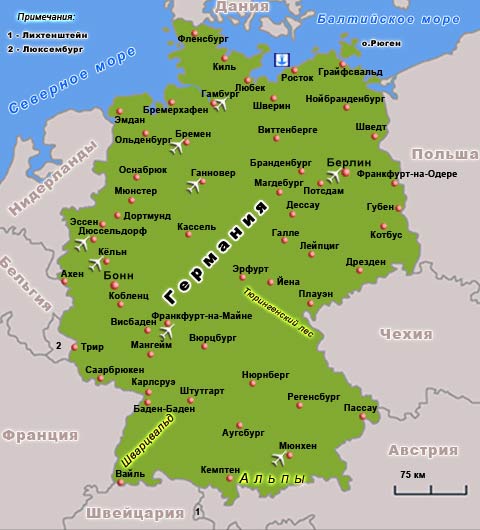
Map of Germany showing all airports
Also, if notification of termination of refugee status is received, the citizen will not be able to exercise this right in the Eurozone countries, as well as in Iceland, Norway, and Switzerland.
Current epidemiological situation in Germany
To date, 2,461,801 cases of coronavirus infection have been officially recorded in Germany. Over the past day, the number of cases increased by 1,559 people. The number of deaths from Covid has reached 71,319, 81 of which were recorded in the last 24 hours. Since the beginning of the pandemic, 2,264,600 people have completely recovered from Covid-19.

